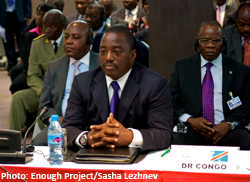
Note: This op-ed originally appeared in Foreign Affairs and was written by Enough Project Founding Director, John Prendergast and Associate Director of Policy, Sasha Lezhnev.
In July of last year, U.S. President Barack Obama gave a landmark speech at the African Union (AU) headquarters in Addis Ababa, criticizing leaders who undemocratically change their constitutions to stay in power and emphasizing that the United States would call out such behavior. He pointed to Burundi where a few months earlier, President Pierre Nkurunziza pressured the courts to change the constitution’s term limits so that he could run for a third time. Obama warned that such a tactic could trigger “instability and strife,” as well as hamper “Africa’s democratic progress.” But his words seem to have fallen on deaf ears.
A few months later, in October 2015, President Denis Sassou Nguesso of the Republic of the Congo (Brazzaville) held a referendum for extending the presidential term limits. Apparently over 92 percent of those who voted agreed. Two months later, Rwanda also called for a vote on term limits, resulting in a similar outcome. And in February 2016, Uganda’s election was marked by wide irregularities, multiple arrests of the leading opposition candidate, and social media blackouts, all of which helped President Yoweri Museveni extend his 30-year hold on power. In the most worrying case, Democratic Republic of the Congo President Joseph Kabila not only tried to remove term limits and undermine the country’s constitution, but also violently suppressed the demonstrations that followed. He has sought to delay elections scheduled for later this year and silence the opposition—issuing an arrest warrant for his main rival and hiring…

